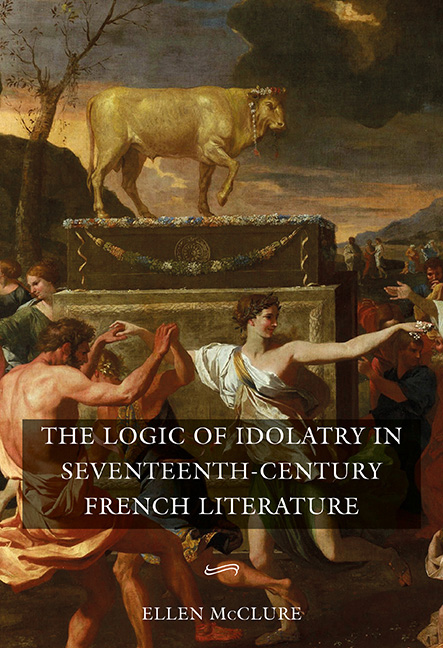Book contents
- Frontmatter
- Contents
- Notes on Translations
- Introduction: The Logic of Idolatry and the Question of Creation
- 1 Idolatry and Instability in Honoré d'Urfé's L'Astrée
- 2 Descartes’ Meditations as a Solution to Idolatry
- 3 Idolatry and the Questioning of Mastery in La Fontaine's Fables
- 4 Idolatry and the Love of the Creature in Sévigné's Letters
- 5 Theatrical Idolatry in Molière and Racine
- Conclusion: The End(s) of Idolatry
- Acknowledgments
- Bibliography
- Index
- Miscellaneous Endmatter
Introduction: The Logic of Idolatry and the Question of Creation
Published online by Cambridge University Press: 28 April 2020
- Frontmatter
- Contents
- Notes on Translations
- Introduction: The Logic of Idolatry and the Question of Creation
- 1 Idolatry and Instability in Honoré d'Urfé's L'Astrée
- 2 Descartes’ Meditations as a Solution to Idolatry
- 3 Idolatry and the Questioning of Mastery in La Fontaine's Fables
- 4 Idolatry and the Love of the Creature in Sévigné's Letters
- 5 Theatrical Idolatry in Molière and Racine
- Conclusion: The End(s) of Idolatry
- Acknowledgments
- Bibliography
- Index
- Miscellaneous Endmatter
Summary
“Il paraît qu’il n’y a eu aucun peuple sur la terre qui ait pris le nom d’idolâtre.” (It appears that there has never been a people on earth that has claimed the name of idolater.) With these words, Voltaire transformed a term that had only recently been the source of bitter religious and civil division into an empty insult. Indeed, in the lines that follow, Voltaire illustrates that the term was used, quite simply, to denigrate religions other than one's own, asking of the “pagans,”
De quel oeil voyaient-ils donc les statues de leurs fausses divinités dans les temples? Du même oeil, s’il est permis de s’exprimer ainsi, que les catholiques voient les images, objets de leur vénération. L’erreur n’était pas d’adorer un morceau de bois ou de marbre, mais d’adorer une fausse divinité représentée par ce bois et ce marbre.
How do they then view the statues of false divinities in temples? The same way, if I may express myself thus, that Catholics see images which are the objects of their veneration. The error was not in adoring a piece of wood or marble, but rather a false divinity represented by this wood and marble.
Voltaire's equation of “pagan” worship with Catholic religious practices is, as his “s’il est permis de s’exprimer ainsi” indicates, meant to provoke. But it is also meant to turn the reader's attention away from the central question posed by idolatry: that of the status of the material supports – the wood or marble – of religious practice, and, by extension, that of the precise relationship between heaven and earth. By dismissing the question of materiality and jumping straight to the issue of the legitimacy of that which is represented by the wood or marble, Voltaire is able to conclude that idolatry is, and always has been, a cover for bigotry, for preferring one's own objects of worship to those of others.
Unsurprisingly, given the place of the Enlightenment in the unfolding of Western thought, Voltaire's dismissal of idolatry closely resembles our own.
- Type
- Chapter
- Information
- Publisher: Boydell & BrewerPrint publication year: 2020



